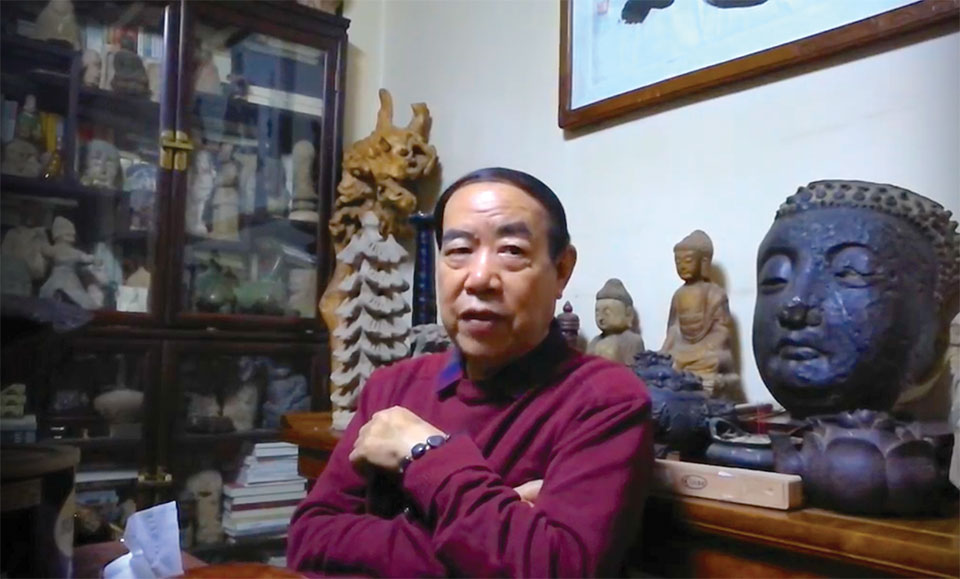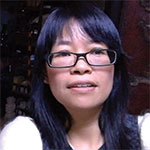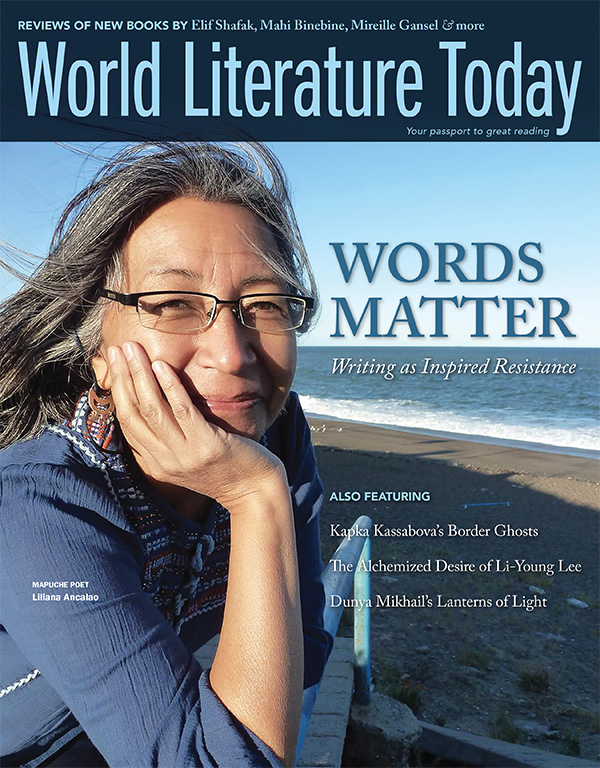Memory, Literature, and Revised History: A Conversation with Jia Pingwa

Jia Pingwa is a globally renowned Chinese writer who has lived through and written about major changes in Chinese society since 1978 when China launched the reform and opening-up policy.
Born in 1952, Jia grew up in a village southwest of Xi’an and as a young adult first wrote simple propagandistic poems and articles for a local government construction project. Based on these early achievements, local authorities recommended him to attend Xibei University. During his university period, his first short stories and essays were published. After graduating in 1975, Jia worked as an editor for a local literary magazine and continued his writing, through which he pioneered nearly every important literature movement, from the root-seeking movement in the mid-1980s to the neohistorical novel movement in the 1990s.
In 1993 his novel Feidu (The abandoned capital) depicted the moral corruption and spiritual emptiness of urban intellectuals. This book was censured by the Chinese government based on charges of explicit sexual descriptions and political satire. The ban resulted in Jia acquiring renowned status as a liberal intellectual. Ironically, due to the burgeoning black market in pirated works in China, Feidu became a best-selling book in 1993 and so further popularized Jia. Through later works, including twelve novels and numerous short stories, Jia continued to expose the devastating impact of urbanization on rural society as well as the increasing social injustice and moral deterioration that were occurring with Chinese modernization.
Shifting from such focus, Jia recently published two novels, Gulu (China) in 2012 and Lao sheng (The old scholar) in 2014, about the Cultural Revolution (1966–76) and other disastrous Chinese Communist political campaigns, taboo subjects rarely explored in his previous works. This sharp shift is particularly intriguing given that Chinese society has remained largely silent about these traumatic periods. I started the interview in 2016 regarding these later works and how they reflect his own experiences and recollections.
Min Yang: Gulu (China) exposed how the Cultural Revolution initiated and accelerated massive violence in a remote village. The protagonist, named Dog-Mushroom, is a malnourished and alienated teenager. Does the Dog-Mushroom character bear some resemblance to you as a teenager?
Jia Pingwa: I was a victim of the Cultural Revolution. My father was condemned as a counterrevolutionary. Back then it was a serious crime that could end with execution. My father’s life was very simple. He had taught his entire life in primary schools without connection to the larger society and politics.
Yang: How could he possibly commit a political crime?
Jia: My father was born in a remote village in Shaanxi. He loved reading and learning. To support his education, his three brothers worked hard on the farm. After he graduated from Xi’an Teachers’ College, he taught Chinese language at several primary schools in suburbs of Xi’an, while my mother and I lived in our hometown village.
Two things brought him disaster at the outset of the Cultural Revolution. One thing is that before the liberation in 1949, the KMT (the Chinese Nationalist Party) general Hu Zongnan, who occupied Shaanxi, held a conference at the Xi’an city square. As corrupt as the current Communist government is, when the leader of the KMT government called for meetings, all people had to go. My father’s school submitted a roster of people who would attend the conference. My father was listed; nevertheless, he actually didn’t go. This list was put into my father’s files but recorded as a list of KMT’s spies who attended spy training workshops.
The second thing is my father’s brother-in-law was the captain of the South-Shaanxi Communist guerrillas. He gave my father a gift of a KMT military uniform that he had seized during the Chinese Civil War (1946–49). The woolen uniform was considered very luxurious in the village. My father only wore it for Spring Festival and otherwise stored it in his suitcase, which he carried with him wherever he moved.
To repay his brothers’ support of his own education, my father paid for the education and accommodation of all his brothers’ children in Xi’an City. At the outbreak of the Cultural Revolution, people were being brainwashed, and everybody wanted to be an active revolutionary. My cousin, then staying with my father, was angry with my father, who had disciplined my cousin for his lazy attitude toward his studies. With revolutionary fervor, he posted a big character poster at my father’s school accusing my father of being a military warlord. People rallied at my father’s house at school and found the KMT uniform in his suitcase. This caused a huge sensation. They immediately investigated my father’s file, where they found my father was on the list of KMT spies. Overnight my father became revealed as a spy. He was fired and sent back to our village.
I will forever remember the day when my father returned to our village home. The onset of the Cultural Revolution had forced me to stop my education because my school had closed. I worked in the people’s commune as a teenage farmer. Adult laborers could earn ten working points per day, but because I was a teenager I earned three points per day, which was equal to six cents.
The day my father returned, I was working in a sweet potato field on a hill. From the hill I could see the main road to the village. I saw three people entering the village—the one in front was my father, followed by two soldiers pointing their guns toward him. I threw down my tools and ran home. I saw my father sitting on the bed alone, the two soldiers having already left. The moment my father saw me, he suddenly held me in his arms, crying, “My child, I ruined your life!” This was the only time in my life I saw my father’s tears. Being a son of an antirevolutionary during that time meant I would never get a job in the city. For a young man in a village, getting a job in the city was the only way out of poverty. Even if I stayed in the village, I would not get food from the people’s commune and no woman would marry me. Suddenly, nobody dared to communicate with us. We were alienated in the village, and we fell into extreme poverty.
Yang: Were you horrified at this sudden shift?
Jia: I felt bad, but I was just a kid. Soon I didn’t feel anything. My father believed his case was a mistake. However, he was so traumatized that he completely lost his ability to write. It fell upon me to write appeal letters to all levels of government. He told me his stories again and again, and I wrote them down repeatedly. I therefore knew every detail of his life. I wrote forever and forever, waiting but for nothing. At the very beginning I used letter paper, when we ran out of that paper because we couldn’t afford it, I went to grocery stores to pick up wrapping paper. I collected anything that I could write on. I especially cherished paper, and I still have the habit of not wasting paper.
Yang: How long did this last?
I was amazed by Western painting and theories such as impressionism, fauvism, and cubism. I integrated the theories of Western painting into my writing.
Jia: Around five years, until 1972 when my father’s case was under review. In 1975 his case was eventually rectified.
Yang: You started to publish in the mid-1970s. Did your early writing bear features of Mao’s literature?
Jia: I started writing by imitating the political commentaries, poetry, and folk songs published in newspapers in the 1970s when I worked as a propagandist at a work site for building a reservoir near my hometown. By then there was a national movement called “Learning from Dazhai Village.” I made, all by myself, a one-page newspaper, one issue per week for laborers who were selected from each village to build the reservoir. I wrote poems and the lyrics of songs for a propaganda team that I organized to perform at the work site. This actually was my first official writing experience. Because of this I was recommended to go to the university.
Yang: You pioneered the “revolution” of contemporary Chinese literature in content and form during the 1980s. Did any writers of world literature inspire you? What do you think of the experiments of language and literary form during that period?
Jia: Not that much, although I like William Faulkner. I felt familiar with his novels because Faulkner, like me, wrote about the people in his hometown. In fact, however, the first thing introduced into China during the 1980s was not literature but theories of Western art. I like painting. I was amazed by Western painting and theories such as impressionism, fauvism, and cubism. I integrated the theories of Western painting into my writing—not the usage of colors, of course, but the overall styles.
In the 1980s, writers promoted the idea of “using the Western form to express Chinese thoughts.” I disapproved of this. I advocated that we should learn the Western thoughts of humanity but employ authentic Chinese language and form. In my novels, I use local dialects, customs, and classic Chinese words that other people do not use.
Yang: In 1993 when Feidu was banned, you were attacked for disseminating spiritual pollution. Did that political charge horrify you and your father?
Jia: I was not horrified because I had experienced two political movements after I started my writing career. One was during the Campaign against Bourgeois Liberalization, and the other was during the Anti-Spiritual Pollution Campaign. Both happened during Deng Xiaoping’s period. Both movements targeted literature and art. The Central Propaganda Department organized a forum of writers and artists aiming to criticize Bai Hua. Bai Hua wrote a film script called Bitter Love in which Bai Hua raised a stunning question for the people in the early 1980s: “You love our country; does our country love you?” However, when the government official who monitored the forum categorized “the group of bourgeois liberalization” with Bai Hua, he mentioned my name by saying, “Jia Pingwa also belongs to this group.” Within one month, just by that one sentence, eight Chinese top journals published many critical articles, saying that my thought was not right and not healthy.
Things got worse in 1993 when my works were not allowed to be published. My father felt panic. At that time, people didn’t know where and how the society would develop. If the Communist Party didn’t like me, many generations of my family could be shamed. But then things got better as the influence of extreme leftists gradually subsided.
Yang: Did these experiences impact your free expression? I mean, in general, are you aware of an inner censorship in your writing process that makes you avoid writing things you know you should not write?
Jia: I do have a plan and concerns before I write. But once I start, my writing follows my thoughts, and I just kept going without change.
Yang: Lao sheng covers nearly the entire Chinese Communist history from the 1930s through the turn of the new century. Particularly you recounted traumas of the early Communist history such as the brutality of the land reform campaign in the 1940s to the 1950s, which was rarely represented in contemporary Chinese literature. Do the fictional representations reflect the real history?
Jia: The land reform was based upon my interviews with Communist Party officials who were in charge of the movement in my hometown. They revealed to me the brutal aspects of that history. Remember, each revolution and political movement in China was a revolution of land. Chinese farmers suffered.
Yang: Unlike your previous novels, this novel consists of four parts, each covering an important historical period of the Communist Party and each beginning with an excerpt from Shanhaijing (The Classic of Mountains and Seas). Why did you skip 2000 years of Chinese history but directly connect the Communist history with this ancient book of mythology and geography? The novel ends with a description of SARS (Severe Acute Respiratory Syndrome) as a plague. What is the message you intended to convey in the novel?
Jia: The land in China is the best, and the land does not change. What was transforming was the Chinese people. I wanted to demonstrate how we became who we are. The education of the people by the Communist Party failed after China’s reform and opening up. Chinese people no longer believed in the Communist ideology and instead sought money and power. The country also concentrated on economic development at any cost. These factors brought about social problems such as environmental pollution, a collective loss of faith, and moral corruption.
Yang: You were invited to President Xi Jinping’s Forum on Literature and Art in 2014. Will “Xi’s Talk” impact or restrain your future works?*
Jia: The talk won’t impact my writing in any way. There are some subjects that other writers may not write, or if they write, their works may not be published. But I can write and I can get my works published. I have exposed and reflected on the problems of our society and will continue to do so. My intention is to make China better. Only by exposing the problems of society can a society improve and make progress.
Yang: What have you been recently working on?
Jia: A novel about human trafficking. I disclose the serious problems of trafficking in women through abduction and deception and the problems they face even after they are rescued. I suggest you read this novel when you get a chance.
Yang: I certainly will. Thank you very much for your time.
January 2016
Editorial Note: In October 2017 Amazon Crossing published Happy Dreams, Nicky Harman’s English translation of Jia Pingwa’s novel depicting life in industrializing contemporary China through Hawa “Happy” Liu, whose quest takes him from his rural home in Freshwind to the city of Xi’an.
*At the forum, Chinese president Xi Jinping made a speech to articulate his views on literature and art. This is referred to as “Xi’s Talk” by some media. Xi’s Talk restates the fundamental principle of literature and art set forth in “Mao’s Yan’an Talks” in 1942, that is, literature and art should serve the people. It also emphasizes the sociopolitical function of literature in realizing the “China Dream” and stresses that works of literature and art should promote patriotism and restrain the disclosure of the dark side of society.











